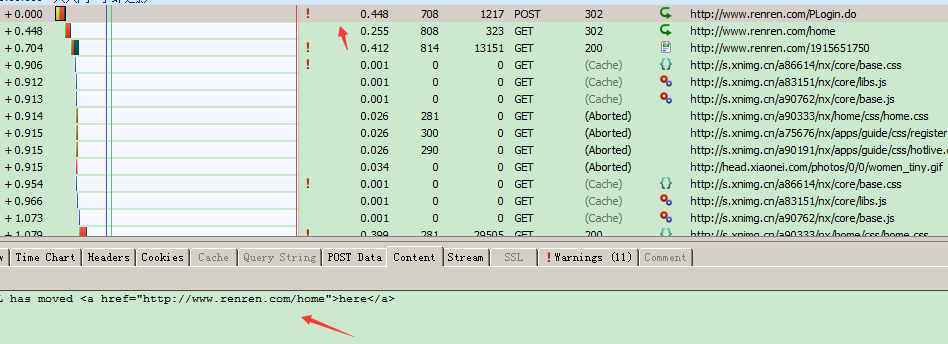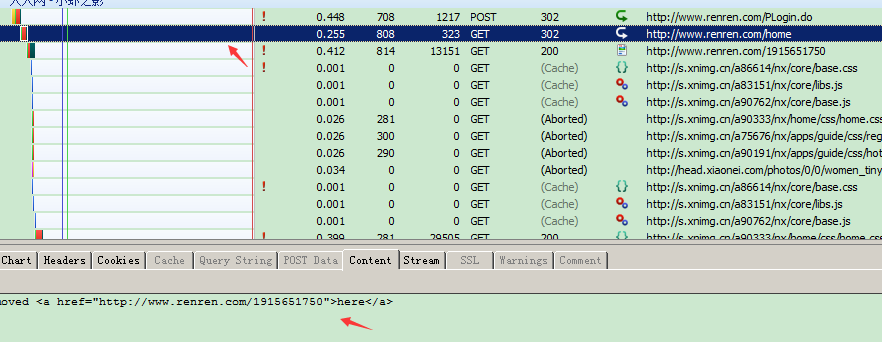使用C#的HttpWebRequest模拟登陆访问人人网
使用任何语言做模拟登陆或者抓取访问页面,无外乎以下思路:
第一 启用一个web访问会话方法或者实例化一个web访问类,如.net中的HttpWebRequest;
第二 模拟POST或者GET方式提交的数据;
第三 模拟请求的头;
第四 提交请求并获得响应,及对响应做我们所需要的处理。
这里我们以人人网的登录为例,将涉及到POST以及GET两种请求方式。
大家使用抓包工具(IE调试工具/httpwatch)都是可以的,我这里采用httpwatch,登陆人人网的时候(www.renren.com),一共做了一个POST请求以及两个GET请求,如下图:

post了一个后,第一个返回状态值是200的一般就是登录后的首页地址,有些网页需要跳转的比较多一些,但是方法都是一样的,
观察这三个请求的详细信息,不难看出这里都是顺序的,第一个GET请求的地址由POST的响应得到,而第二个GET请求的地址又由第一个GET的响应得到。
每次请求与下一次请求之间的联系就是每次请求后返回的Cookies数据,前一次的返回Cookie数据需要同下一次请求一同发送到服务器,这也是C#模拟网站登陆的关键。
这里需要注意几点:
一、选择需要post的地址,可以通过工具查看获得,也可以通过查看网页源代码获得。

二、content可以查看返回的内容,或者是包含下一跳的链接地址。到最后一定是首页的网页内容。



先来模拟第一个POST请求
- HttpWebRequest request = null;
- HttpWebResponse response = null;
- string gethost = string.Empty;
- CookieContainer cc = new CookieContainer();
- string Cookiesstr = string.Empty;
- try
- {
- //第一次POST请求
- string postdata =“”email=adm13956587&password=786954887&icode=&origURL=http%3A%2F%2Fwww.renren.com%2Fhome&domain=renren.com&key_id=1&captcha_type=web_login" //模拟请求数据,httpwatch中点击stream,就可以直接复制了
- string LoginUrl="http://www.renren.com/PLogin.do";
- request = (HttpWebRequest)WebRequest.Create(LoginUrl);//实例化web访问类
- request.Method = "POST";//数据提交方式为POST
- //模拟头
- request.ContentType = "application/x-www-form-urlencoded";
- byte[] postdatabytes = Encoding.UTF8.GetBytes(postdata);
- request.ContentLength = postdatabytes.Length;
- request.AllowAutoRedirect = false;
- request.CookieContainer = cc;
- request.KeepAlive = true;
- //提交请求
- Stream stream;
- stream = request.GetRequestStream();
- stream.Write(postdatabytes, 0, postdatabytes.Length);
- stream.Close();
- //接收响应
- response = (HttpWebResponse)request.GetResponse();
- //保存返回cookie
- response.Cookies = request.CookieContainer.GetCookies(request.RequestUri);
- CookieCollection cook = response.Cookies;
- string strcrook = request.CookieContainer.GetCookieHeader(request.RequestUri);
- Cookiesstr = strcrook;
- //从返回的stream当中取第一次GET跳转地址: The URL has moved <a href="http://www.renren.com/home">here</a>
- StreamReader sr = new StreamReader(response.GetResponseStream(), Encoding.UTF8);
- string content = sr.ReadToEnd();
- response.Close();
- string[] substr = content.Split(new char[] { '"' });
- gethost = substr[1]; //http://www.renren.com/home
- }
- catch (Exception)
- {
- //第一次POST出错;
- }
注释写的很详细了,在这就不再分析,也许有人对request = (HttpWebRequest)WebRequest.Create(LoginUrl)有疑问,可以去google一下HttpWebRequest和WebRequest的区别,简单来说WebRequest是一个抽象类,不能直接实例化,需要被继承,而HttpWebRequest继承自WebRequest。
再模拟第一个和第二个GET请求
- try
- {
- request = (HttpWebRequest)WebRequest.Create(gethost);
- request.Method = "GET";
- request.KeepAlive = true;
- request.Headers.Add("Cookie:" + Cookiesstr);
- request.CookieContainer = cc;
- request.AllowAutoRedirect = false;
- response = (HttpWebResponse)request.GetResponse();
- //设置cookie
- Cookiesstr = request.CookieContainer.GetCookieHeader(request.RequestUri);
- //取再次跳转链接 The URL has moved <a href="http://www.renren.com/1915651750">here</a>
- StreamReader sr = new StreamReader(response.GetResponseStream(), Encoding.UTF8);
- string ss = sr.ReadToEnd();
- string[] substr = ss.Split(new char[] { '"' });
- gethost = substr[1]; //http://www.renren.com/1915651750
- request.Abort();
- sr.Close();
- response.Close();
- }
- catch (Exception)
- {
- //第一次GET出错
- }
- try
- {
- //第二次GET请求
- request = (HttpWebRequest)WebRequest.Create(gethost);
- request.Method = "GET";
- request.KeepAlive = true;
- request.Headers.Add("Cookie:" + Cookiesstr);
- request.CookieContainer = cc;
- request.AllowAutoRedirect = false;
- response = (HttpWebResponse)request.GetResponse();
- //设置cookie
- Cookiesstr = request.CookieContainer.GetCookieHeader(request.RequestUri);
-
StreamReader sr = new StreamReader(response.GetResponseStream(), Encoding.UTF8);
-
string ss = sr.ReadToEnd();
- webBrowser1.Navigate("about:blank");
-
webBrowser1.Document.OpenNew(true);
-
webBrowser1.Document.Write(ss);
- request.Abort();
- response.Close();
- }
- catch (Exception)
- {
- //第二次GET出错
- }
GET与POST请求大同小异,这里便不再累述。三次请求结束,保存好你的cookie string,每次请求的时候都赋给请求的头部,你就处于登录状态了。




 浙公网安备 33010602011771号
浙公网安备 33010602011771号